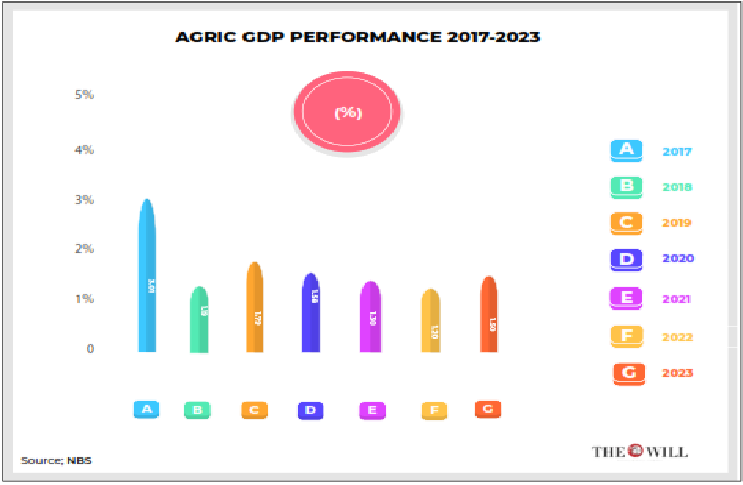December 03, (THEWILL) – The policy shift by the Central Bank of Nigeria (CBN) on its development finance activities will pave the way for the Bank of Industry (BOI) and the Development Bank of Nigeria (DBN) to expand their support for the micro, small and medium enterprises (MSMEs) towards advancing the nation’s economic development..
The bank’s involvement in development financing is driven by the need to address market failures resulting from the apathy of banks to lend to critical sectors/segments of the economy due to perceived risks.
Through its interventions, the bank has improved access to affordable and long-term finance to the real sector, de-risked these priority sectors by incentivising banks and other financial institutions to lend, and stimulated investments in the productive base of the economy.

It has been shown that the interventions of the Bank are targeted at priority sectors of the economy that have the potential to transform the productive base of the economy to facilitate growth, stimulate sustainable jobs, expand the non-oil export basket to enhance the foreign exchange earning capability of the economy, and facilitate financial inclusion.
Traditionally, the emphasis of these interventions is to stimulate the flow of affordable credit to targeted priority sectors with high growth impact and employment elastic potential, such as agriculture, manufacturing, energy/infrastructure, healthcare, MSMEs and exports.

However, during is screening by the Senate last September, the current CBN Governor, Dr Olayemi Cardoso, said the apex bank under his watch would play down on its role in the development finance space. Similarly, at the Bankers’ Committee meeting in Lagos on Friday, November 24, Cardoso reiterated the position to restrategise the development finance roles of the institution.
His words, “I am aware that events over the past few years have also put the CBN in bad light.
“These issues can be attributed to various factors, such as corporate governance failures, diminished institutional autonomy of the Central Bank of Nigeria, a deviation from the core mandate of the Bank, unorthodox use of monetary tools, an inefficient and opaque foreign exchange market that hindered clear access, a foray into fiscal activities under the cover of development finance activities.
“There was also a lack of clarity in the relationship between fiscal and monetary policies, among other challenges.
“Hitherto, the CBN had strayed from its core mandates and was engaged in quasi-fiscal activities that pumped over 10 trillion naira in the economiy through almost different sectors ranging from agriculture, aviation, power, youth and many others.
“These clearly distracted the Bank from achieving its own objectives and took it into areas where it clearly had limited expertise.”
An agro-processing operator, James Kalakie, said the CBN should rethink its decision to reduce its involvement in the intervention funds projects.
“The CBN should reconsider its position on the support of small businesses because the Bank really created the avenues for small business operators to survive at difficult times of the economy; the new CBN leadership should approach the new policy with caution,” Kalakie said.
The two development financial institutions the CBN aims to partners with in its new policy framework are the Bank of Industry (BOI) and the Development Bank of Nigeria (DBN).
Both have their related objectives focused on providing the real sector with finance as well as business support services. Because these industries are mainly industrial, BOI is charged with providing finances to purchase equipment for value chain productions
Notwithstanding the challenging environment, the bank has discharged its mandate as a catalyst for industrialisation. Working with the commercial banks, BOI through its various programmes, has supported not less than 15,000 youths since 2019, in addition to its participation in the various Central Bank of Nigeria (CBN) intervention funds..
With the decision of the new CBN leadership to play down on its development finance activities and the imminent full take-off of the African Continental Free Trade Agreement (AfCFTA), it is expected that BOI will play a greater role in the pursuit of its statutory mandate of industrialisation.
THEWILL recalls that In line with the focus of the Federal Government to revitalise Nigeria’s industrial sector and create millions of jobs by leveraging the Nigeria Industrial Revolution Plan and the Economic Recovery and Growth Plan, the BOI successfully concluded a landmark US$1 billion loan syndication transaction three years ago. The transaction was aimed at further improving the capacity of the bank to continue to effectively support micro, small, medium and large enterprises (across key sectors) of the Nigerian economy with affordable loans of medium to long-term tenor, alongside moratorium benefits
On its part, the DBN has pursued the strategies in its support for the MSMEs to navigate the current troubled economy, triggered by the recent fuel subsidy emoval, naira devaluation, high inflation and deepening pains of multiple taxes, among other challenges.
In its policy document seen by THEWILL, the development financing institution articulated action steps to pursue its mandate of supporting and developing small businesses, a sector it acknowledged as the spring board to economic development worldwide.
“Small businesses are known to be the springboard of development worldwide, creating economic opportunities, especially for those at the lower rung of the economic ladder. Nigeria, being an ever-entrepreneurial nation, is no exception.
“With over 40 million MSMEs, accounting for 96 percent of all businesses, 84 percent of employment, and approximately 50 percent of the entire GDP, MSMEs make a remarkable contribution to our nation’s development,” the bank said in the document signed by its managing director/CEO, Tony Okpanachi.
Outlining the strategies to propel the MSMEs to greater heights, the bank said it would leverage their strength to facilitate growth in crucial sectors such as Agriculture, Education, Health, Manufacturing and work towards tackling challenges like energy poverty and struggling tourism sectors.
THEWILL findings showed that the bank plans to build on the financing support it has offered to its participating financial institutions. According to it, this will result to increasing the over 313,000 MSMEs that have benefited from its financing support amounting to the tune of N631 billion as of December 2022 and leading to the creation of more than 900,000 jobs.
It said it would harness the potential of the sector to support green transactions and combat climate change, a move he said represents the compelling vision it has for Nigeria’s short- to med-term future.
“They underpin our mandate and drive to continue supporting MSMEs with development financing, with the hope that our efforts will result in enviable growth and development that other parts of the world can learn from,” the bank said.
According to the policy document, the bank plans to build on the support it offered to its participating financial institutions in 2022. The target is to increase the over 313,000 MSMEs that have benefited from its financing from which over 900,000 jobs were created.
To fast-track growth of the MSMEs during the challenging period, DBN has created a sector-focused plan that would build on the current achievement.
Data from the plan showed that more than N230 billion have been channelled to support small businesses in the Trade and Commerce sector over the past 5 years leading up to December 2022, based on which it would offer support to the sector in the 2023 short-term arrangement.
As a result, the Bank plans to increase support to MSME players in the Manufacturing sector which it has committed over N69 billion in financing.
“The Development Bank of Nigeria (DBN) recognises the significance of agriculture in the country’s economy and has allocated substantial funding to agro-MSMEs. As of December 2022, the Bank has provided N27 billion to Agro-MSMEs.
The need to intensify support for the small business operators is underscored by the prevailing economic challenges. The organised private sector, the National Bureau of Statistics (NBS), and the Small and Medium Enterprises Development Agency of Nigeria (SMEDAN) have at various times drawn attention to the high rate of business closure and job losses among the MSME operators in the past eight years.
The Manufacturers Association of Nigeria (MAN) has continued to lament over the country’s tough operating environment which forces its members to shut down operations or relocate to other neighbouring countries, which constraints the sector’s growth, especially the MSMEs involved in the backward integration value chain.
Backward integration is a practice where companies are encouraged to cultivate their own raw materials locally and purchase from their local suppliers or establish farms to grow produce for their factories. The government put the measure in place to save foreign exchange, create jobs, boost productivity and grow the GDP.
Experts believe that the development financial institutions should step up their support to enable the MSMEs to play a more active role in the value chain ecosystem.
The CEO, Centre for the Promotion of Private Enterprise (CPPE), Dr Muda Yusuf, applauds the role of the institutions in developing the MSMEs which constitute the engine of the economy. He urged them to do more at this time and suggested that the development banks be recapitalised, if it is necessary, to enable them to play a bigger role in providing financing and capacity building to the MSMEs.
About the Author
Sam Diala is a Bloomberg Certified Financial Journalist with over a decade of experience in reporting Business and Economy. He is Business Editor at THEWILL Newspaper, and believes that work, not wishes, creates wealth.




